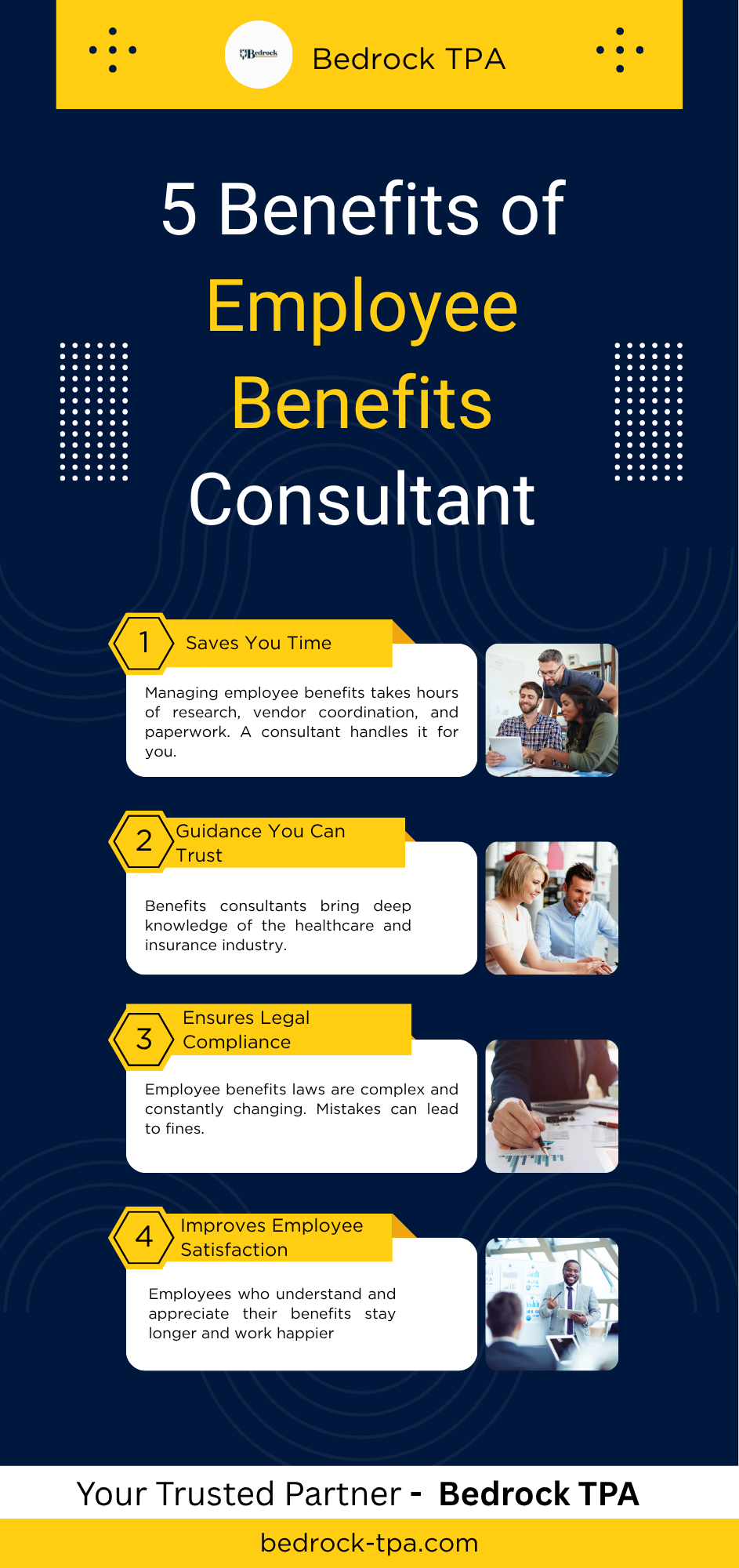
In today’s rapidly evolving work environment, offering competitive employee benefits isn’t just about keeping up—it’s about standing out. But designing and managing benefits that support your workforce and stay within budget isn’t simple. That’s where an employee benefits consultant comes in.
If you're an employer looking to better support your team, reduce administrative burdens, and stay compliant with the latest regulations, this guide is for you. We'll explore what benefits consultants do, why they matter in 2025, and how they can transform your approach to employee care.
Why Employee Benefits Are Crucial for Employers
Employee benefits are one of the most important factors in attracting and retaining top talent. Beyond salaries, employees now expect meaningful benefits that support their health, family, and future.
Here’s why having the right benefits strategy is essential:
Helps you attract and retain skilled employees
Enhances job satisfaction and productivity
Reduces turnover and related hiring costs
Keeps your business compliant with labor laws
Strengthens your overall employer brand
With healthcare costs rising and employee expectations growing, managing benefits internally can become overwhelming for many HR teams. That’s why working with a consultant can make a real difference.
What Is an Employee Benefits Consultant?
An employee benefits consultant is a professional advisor who helps businesses design, manage, and optimize their employee benefits programs. Think of them as an extension of your HR and finance team—bringing expertise, market insight, and hands-on support.
They don’t just sell insurance. They assess your workforce needs, analyze your current plans, compare vendor options, and recommend cost-effective solutions that align with your company’s goals.
Key Responsibilities Include:
Analyzing current benefit offerings and cost structures
Designing tailored benefits packages (including group health insurance)
Sourcing and negotiating with insurance carriers and providers
Assisting with employee onboarding and benefits education
Ensuring compliance with regulations such as HIPAA, ACA, and ERISA
Managing annual renewals and resolving issues during the year
The Benefits of Working With a Consultant
Employers that partner with a benefits consultant often see measurable improvements in efficiency, employee engagement, and long-term cost savings.
Here’s how a consultant adds value:
Customized Plan Design
Every business has different needs. Consultants help you create plans that reflect your team’s demographics, industry trends, and financial goals.
Cost Control
By analyzing usage trends and carrier options, consultants identify ways to manage rising healthcare costs without reducing coverage quality.
Simplified Benefits Administration
From paperwork to platform integration, consultants streamline benefits administration, making HR’s job easier and reducing the chances of costly errors.
Employee Support
Consultants can help employees better understand their benefits, boosting enrollment and satisfaction.
Regulatory Compliance
With healthcare laws changing regularly, staying compliant is critical. Consultants ensure you’re meeting federal and state requirements to avoid penalties.
How Consultants Work with Third Party Administrators (TPAs)
In many cases, benefits consultants collaborate closely with third party administrators (TPAs)—specialized firms that handle the back-end processing of health plans, claims, and compliance reporting.
A trusted TPA like Bedrock TPA works alongside your consultant to:
Handle claims processing and benefits verification
Provide insights into usage trends and cost drivers
Ensure accurate, timely compliance reporting
Offer dedicated support for both employers and employees
This team-based approach ensures your company’s benefits program runs smoothly, stays compliant, and delivers real value to your team.
Actionable Tips for Choosing the Right Benefits Consultant
If you’re ready to find a consultant, here are some practical steps to guide your decision:
1. Look for experience in your industry
Some consultants specialize in specific sectors like tech, healthcare, or manufacturing. Choose one who understands your market and workforce challenges.
2. Evaluate their communication style
A good consultant isn’t just knowledgeable—they’re also responsive, transparent, and easy to work with.
3. Ask about their carrier relationships
Consultants with strong connections to insurance providers can help you access better rates and plan flexibility.
4. Inquire about compliance expertise
They should be well-versed in regulatory updates and help you maintain HR compliance effortlessly.
5. Request case studies or client references
Seeing past successes can give you confidence in their ability to support your organization.
Frequently Asked Questions (FAQs)
What’s the difference between a benefits broker and a benefits consultant?
While both help source insurance plans, a consultant takes a more strategic, holistic approach. They evaluate long-term goals, compliance needs, and employee satisfaction—not just pricing.
Do small businesses need an employee benefits consultant?
Yes. Even businesses with fewer than 50 employees can benefit from expert guidance, especially when navigating group health insurance or state-level mandates.
How do consultants get paid?
Many work on a commission basis through the carriers they recommend, while others charge flat or hourly consulting fees depending on the scope of service.
Can consultants help with remote or multi-state teams?
Absolutely. The best consultants understand how to structure benefits for distributed workforces and navigate different state regulations.
How can Bedrock TPA support my benefits consultant?
Bedrock TPA works in tandem with your consultant to handle the administrative and compliance side of your benefits plan, making implementation seamless and reducing risk.
Conclusion: Make Employee Benefits Work for You
As employee expectations evolve, so should your approach to benefits. Working with an employee benefits consultant ensures your organization offers competitive, compliant, and cost-effective coverage—without overwhelming your internal team.
Whether you’re designing your first benefits package or looking to upgrade your current offering, having the right partner is key. By combining the strategic insights of a consultant with the operational power of a trusted TPA like Bedrock TPA, you can take your employee experience to the next level.
Want to simplify your employee benefits while keeping costs under control?
Contact Bedrock TPA today to learn how we collaborate with benefits consultants to support smarter, more compliant benefits programs tailored to your business needs.




Write a comment ...